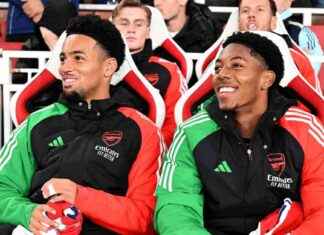Abby-Leigh Doig was just finishing a course on forensic psychology, when she found herself in a field of cows and decided to pursue a new career.
Soon after, a group of heifers arrived on the land in Fife. She knew she wanted to be a farmer.
Abby-Leigh was a young Muslim woman with autism and it was difficult for her to find role models within the industry.
She eventually gained some work experience which led her to an apprenticeship program. Now, the 21-year old hopes to own her own farm.
Abby-Leigh wasn’t sure of her future after three years living in Saudi Arabia.
She binged on true crime documentaries during lockdown, which inspired her study of forensic psychology.
She completed her online level 3 in forensic psychology and was ready to pursue this career path until her cattle moved into the field behind the house.
Abby-Leigh says, “I’ve always had a real interest in animals in general.”
“I like them being around me so seeing the tractor pulling up to a trailer with animals was really exciting.”
After the farmer had left, she returned to the gate with all the cattle. She visited them every day at the gate.
She says that her autism has led to her having a tendency to seek out all information about a topic.
“I keep a notebook with random cow facts and numbers that I have memorized.”
She had no farming experience and wasn’t sure how to get started in the industry.
She added that there was a serious shortage of autistic hijabi farmers.
Abby-Leigh reached out to farmers’ groups via Facebook to find out how she could obtain a job or gain experience. Finally, someone gave her details to a beef farmer.
After a week at his farm, he sent her a link to a preapprenticeship program.
However, the majority of those on the scheme were from agriculture backgrounds.
She recalls, “I came in knowing absolutely nothing about agriculture or anything.”
“I liked cows so I was a bit clueless at the beginning.”
Prof Lee-Ann Sutherland from the James Hutton Institute is an agricultural sociolog who says that apprenticeships are a “fantastic first step” in attracting new people to farming.
She says that while women have been involved in agriculture for centuries, the stigma of white farmers could have contributed to their invisibility.
“This is not a stereotype, it’s a visual presence.
“Males are the most visible face of the farm, and that is what we found in our research.
“You want the farm to continue its family name, so you want it to be passed on to your son. The women accept the role of helpers.
“A farmer’s wife may be very capable and capable of driving tractors or feeding livestock, but it’s the male who is called ‘the farmer.’
Professor Sutherland claims that attitudes are changing and that we will see more female farmers and successors to the farm.
Abby-Leigh is currently completing her modern apprenticeship. She divides her time between two dairy farm farms.
She says that dairy farming is better than beef farming, because it allows for more interaction with the cows.
“I love cows. That’s my favorite thing.”
She volunteers for The Lucky Ewe farm in North East Fife, which aids people with additional support and experience in farming, animal husbandry, and food production.
Abby-Leigh states that her autism makes it clear that structure is very important. This can sometimes be in conflict with the nature and work of a farm.
She says, “If something changes at work, such as the cows in a different field or my brain doesn’t know what to do, then my brain will malfunction.”
“Lucky Ewe’s environment and ability to deal effectively with people like myself is incredible.
They explain everything perfectly. There is never panic.
Abby-Leigh manages the farm’s TikTok accounts and posts about her farming journey and her five chickens on her personal account.
She adds, “I am a big advocate for people spending less time with animals.”
“I love to show people how farm animals can be comforting. When I’m around people, I get really anxious. I don’t talk and I have trouble speaking.
“But I feel instantly calm when I am with sheep, chickens, or cows.”
Other Muslims have commented on TikTok about her desire to go into agriculture, but she doesn’t know where to start.
Prof Sutherland believes Abby-Leigh can inspire people from all backgrounds to enter agriculture.
She said, “It’s always difficult to be the first but it’s something that I fully support.”
“We must ensure that this is a career that everyone can pursue, not just those who inherit the land from their families.”
Abby-Leigh believes she will continue her apprenticeship on dairy farms after her graduation. However, she would like to eventually own her farm.
“I would like to own my smallholding someday, with a few sheep and a few cows. This is my long-term goal.







